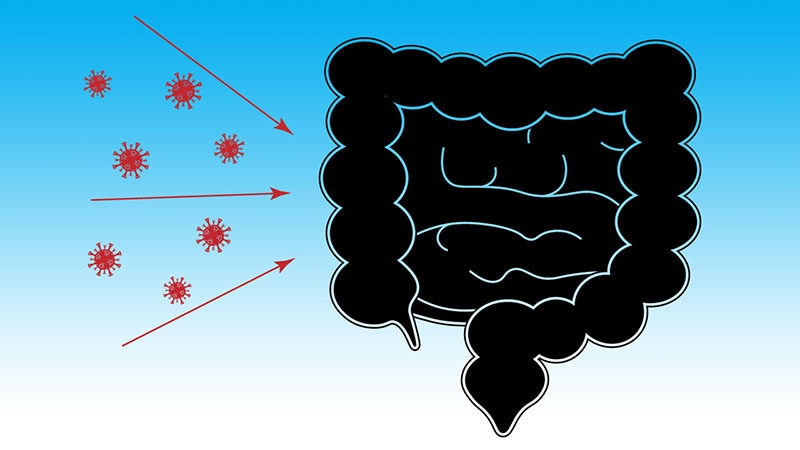Post-COVID-19 GI Symptoms: Are We in for the Long Haul? - Medscape

This transcript has been edited for clarity.
Find the latest COVID-19 news and guidance in Medscape's Coronavirus Resource Center.
Hello. I'm Dr David Johnson, professor of medicine and chief of gastroenterology at Eastern Virginia Medical School in Norfolk, Virginia. Welcome back to another GI Common Concerns.
Today I'd like to focus on the gastrointestinal (GI) manifestations of so-called long-haul COVID-19.
Prior to COVID-19, we never really thought of infections caused by SARS-associated coronavirus in terms of GI illness. That began to change during the early days of the pandemic, when it was recognized that some patients were presenting with GI manifestations, diarrhea being the most notable. GI symptoms such as nausea, vomiting, and abdominal pain sometimes presented antecedent to the respiratory symptoms, and sometimes as the only symptoms related to the course of COVID-19. Other symptoms included anosmia and dysgeusia.
We now know that the COVID-19 virus, SARS-CoV-2, infects the GI tract. We've particularly seen this through the angiotensin-converting enzyme 2 receptor site, which is evident both in the respiratory tract and in the enterocytes of the GI tract. There is evidence not only that the SARS-CoV-2 virus can be detected in the stool but also that the infection can occur via fecal-oral transmission in animal models. This is an issue that we raised early in our COVID-19 coverage with the discussion of the use of public toilets.
The implications for long-haulers, who have otherwise gotten through their 30-day window of acute infection, are really what's in question now. Long-haulers account for a large subset of patients.
A very nice study of databases from the US Department of Veterans Affairs , just published in Nature, looked at over 73,000 patients. Among survivors of COVID-19, investigators identified an increase in such diagnoses as esophageal diseases, abdominal pain, diarrhea, and irritable bowel syndrome, as well as increased use of laxatives, histamine receptor antagonists, and acid-suppressive medicines.
The compendium of GI complaints and disorders that we commonly see in our general practice may be intrinsically tied back to COVID-19.
What's Causing Long-Haul GI Symptoms?
Clearly, dysbiosis is being reported in patients with COVID-19. It's been associated with the increased inflammatory response, or the upregulation of so-called cytokine storms, whereby all of the inflammatory mediators get upregulated. But it seems to be coincident with the dysbiosis that we also see in the gut.
This association makes sense. Given that the enteric nervous system is directly or indirectly affected by the SARS-CoV-2 virus, this potentially leads to gut dysfunction related to the dysbiosis. We've seen this in small intestinal bacterial overgrowth, which was the recent subject of a good systematic review and meta-analysis in patients with functional dyspepsia.
This may also play out with other symptoms, as noted in a recent paper highlighting the effect on serotonin-driven mood and motility. The central nervous system and the enteric nervous system are linked through the brain-gut axis, which potentially may explain why these symptoms are more interconnected than we've potentially given them credit for.
We also know that dysbiosis is associated with an increased risk from at least infectious enteritis with functional diseases like irritable bowel syndrome. Modeling data from back in the late 1990s suggested that if you had a disease that lasted for a period of time, this hypothetically confirmed a 10-fold increased risk for postinfectious irritable bowel syndrome. For its part, COVID-19 lasts for a median length of 12 days.
Discussions of irritable bowel syndrome inevitably give rise to those around functional bowel and functional dyspepsia, as well as the brain-gut axis and how it relates to some of the anxiety, depression, and other mental health disorders that can occur in patients with functional bowel disease.
Additionally, there are clearly some emerging cholangiopathies that we see in some of these long-haulers.
The putative pathophysiologic mechanisms underlying the long-term dysfunction and symptoms generated after COVID-19 certainly include the persistence of gut dysbiosis, which clearly can lead to this intestinal low-grade inflammation.
Known Unknowns: What Remains Unclear?
When taken together, these findings suggest that this inflammation and dysbiosis clearly can lead to a number of manifestations presenting back as GI symptoms.
This clearly is a long-term dysbiosis, but it's uncertain whether it's related to just COVID-19, motility-related diarrhea, and/or the use of antibiotics, antivirals, or whatever treatment patients received when they were hospitalized. It also remains to be seen whether this is something that we can treat in patients by changing the gut microbiome.
Nonetheless, it seems a fair assumption that we can expect a wave of post-COVID-19 functional GI disorders. Clinicians should be aware of this, and not only in patients who have had proven COVID-19 but also perhaps in those who may have had COVID-19 but never underwent diagnostic testing because they only experienced GI symptoms [and may not have connected those to COVID-19].
When it comes to what we can say with confidence, we mostly know what we don't know. Where we go from here remains to be seen. But there is no question that long-haulers and GI disease are intertwined.
I'm Dr David Johnson. Thanks for listening.
David A. Johnson, MD, a regular contributor to Medscape, is professor of medicine and chief of gastroenterology at Eastern Virginia Medical School in Norfolk, Virginia, and a past president of the American College of Gastroenterology. His primary focus is the clinical practice of gastroenterology. He has published extensively in the internal medicine/gastroenterology literature, with principal research interests in esophageal and colon disease, and more recently in sleep and microbiome effects on gastrointestinal health and disease.
Follow Medscape on Facebook, Twitter, Instagram, and YouTube

Comments
Post a Comment